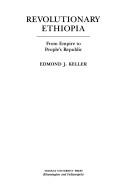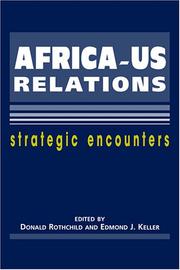| Listing 1 - 10 of 25 | << page >> |
Sort by
|

ISBN: 025335014X 0253206464 Year: 1988 Publisher: Bloomington Indiana University Press
Abstract | Keywords | Export | Availability | Bookmark
 Loading...
Loading...Choose an application
- Reference Manager
- EndNote
- RefWorks (Direct export to RefWorks)
Book
ISBN: 9780253011787 9780253011848 9780253011893 0253011892 1306481449 9781306481441 0253011787 0253011841 Year: 2014 Publisher: Bloomington, IN Indiana University Press
Abstract | Keywords | Export | Availability | Bookmark
 Loading...
Loading...Choose an application
- Reference Manager
- EndNote
- RefWorks (Direct export to RefWorks)
"Reflecting on the processes of nation-building and citizenship formation in Africa, Edmond J. Keller believes that although some deep parochial identities have eroded, they have not disappeared and may be more assertive than previously thought, especially in instances of political conflict. Keller reconsiders how national identity has been understood in Africa and presents new approaches to identity politics, intergroup relations, state-society relations, and notions of national citizenship and citizenship rights. Focusing on Nigeria, Ethiopia, Cote d'Ivoire, Kenya, and Rwanda."--Back cover of print version.
Sociology of culture --- Political sociology --- Sub-Saharan Africa --- Nation-building --- Nationalism --- National characteristics, African. --- Identity politics --- Group identity --- Citizenship --- Identity (Psychology) --- Politics of identity --- Political participation --- Collective identity --- Community identity --- Cultural identity --- Social identity --- Social psychology --- Collective memory --- Birthright citizenship --- Citizenship (International law) --- National citizenship --- Nationality (Citizenship) --- Political science --- Public law --- Allegiance --- Civics --- Domicile --- Political rights --- African national characteristics --- Stabilization and reconstruction (International relations) --- State-building --- Political development --- Political aspects --- Law and legislation --- Africa --- Politics and government.
Book
ISBN: 1555871003 Year: 1987 Publisher: Boulder, Colo. Rienner
Abstract | Keywords | Export | Availability | Bookmark
 Loading...
Loading...Choose an application
- Reference Manager
- EndNote
- RefWorks (Direct export to RefWorks)
Digital
ISBN: 9781685859404 Year: 2022 Publisher: Boulder Lynne Rienner Publishers
Abstract | Keywords | Export | Availability | Bookmark
 Loading...
Loading...Choose an application
- Reference Manager
- EndNote
- RefWorks (Direct export to RefWorks)

ISBN: 1555876242 1555876315 1685853978 Year: 1996 Publisher: Boulder, Colo. London Lynne Rienner Publishers
Abstract | Keywords | Export | Availability | Bookmark
 Loading...
Loading...Choose an application
- Reference Manager
- EndNote
- RefWorks (Direct export to RefWorks)
Political systems --- International groups --- Africa --- Regionalism (International organization) --- Security, International --- Sovereignty --- Régionalisme (Politique internationale) --- Sécurité internationale --- Souveraineté --- United Nations --- Afrique --- Foreign relations --- Relations extérieures --- Security, International. --- Sovereignty. --- Regionalism (International organization). --- Régionalisme (Politique internationale) --- Sécurité internationale --- Souveraineté --- Relations extérieures --- 1960 --- -Africa - Foreign relations - 1960 --- -Africa --- -Regionalism (International organization) --- -Regionalism (International organization). --- Africa - Foreign relations - 1960 --- Africa - Foreign relations - 1960-

ISBN: 9781588264350 1588264351 1626372039 Year: 2006 Publisher: Boulder, Colorado : Lynne Rienner,
Abstract | Keywords | Export | Availability | Bookmark
 Loading...
Loading...Choose an application
- Reference Manager
- EndNote
- RefWorks (Direct export to RefWorks)
Reflecting the debate between state-centered and human-security approaches to security strategy, Africa-US Relations explores the interactions between the US and African countries in a wide spectrum of key arenas. The authors range from such traditional security issues as peacekeeping and terrorism to concerns with HIV/AIDS, environmental degradation, aid policies, and international trade. Their contributions place in sharp relief the differences in inner logic and preferred consequences among alternative strategic perspectives—as well as the implications of those differences for policy choices.
International relations. Foreign policy --- International economic relations --- United States --- Africa --- Etats-Unis --- Afrique --- Relations --- United States of America
Book
ISBN: 1868888894 1868886166 Year: 2012 Publisher: Pretoria : Unisa Press,
Abstract | Keywords | Export | Availability | Bookmark
 Loading...
Loading...Choose an application
- Reference Manager
- EndNote
- RefWorks (Direct export to RefWorks)
In this latest phase of political transitions in Africa, analysts rarely consider the relationship between religion and politics. This book seeks to address this need. It argues among other things that for democracy to be consolidated, political leaders must make the right institutional choices, choices that structure the incentives of their constituents as well as their own away from antagonistic forms of politics or religious extremism. What impact do African contemporary religious organizations and elites have on their societies in terms of intergroup reciprocity and political bargaining? The primary objective of this volume is to analyse how such organizations respond to the political signs and gestures of other groups in a like-minded manner and the nature and effects of their negotiations with the state and other interests over contested matters. The authors of this selection of papers hypothesize that Africa's religious organizations can prove critical in the way their elites make demands on the state and in the way they help to shape the structure of intergroup relations in constructive or destructive directions. They consider the roles of both secular and religious elites and institutions in creating it notes where important differences remain while also pointing out directions in which they can be overcome. Written in an eminently readable style a political climate that enables elites to consolidate democracy.
Religion and politics --- Political science --- Politics, Practical --- Politics and religion --- Religion --- Religions --- Religious aspects --- Political aspects --- Africa --- Religion.
Book
ISBN: 1555871291 1685851452 Year: 1989 Publisher: Boulder (Colorado) Rienner
Abstract | Keywords | Export | Availability | Bookmark
 Loading...
Loading...Choose an application
- Reference Manager
- EndNote
- RefWorks (Direct export to RefWorks)
Book
Abstract | Keywords | Export | Availability | Bookmark
 Loading...
Loading...Choose an application
- Reference Manager
- EndNote
- RefWorks (Direct export to RefWorks)
Multi
ISBN: 9781868888894 9781868886166 Year: 2012 Publisher: Pretoria Unisa Press
Abstract | Keywords | Export | Availability | Bookmark
 Loading...
Loading...Choose an application
- Reference Manager
- EndNote
- RefWorks (Direct export to RefWorks)
Africa --- Religious studies --- Politics
| Listing 1 - 10 of 25 | << page >> |
Sort by
|

 Search
Search Feedback
Feedback About UniCat
About UniCat  Help
Help News
News